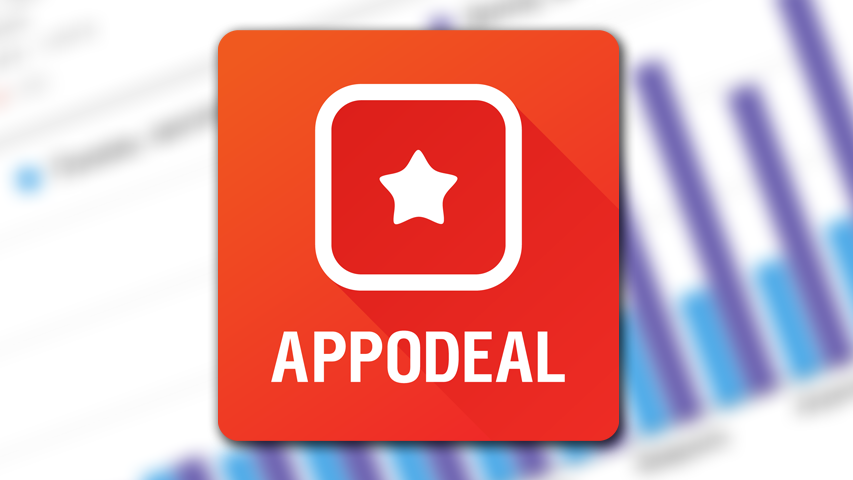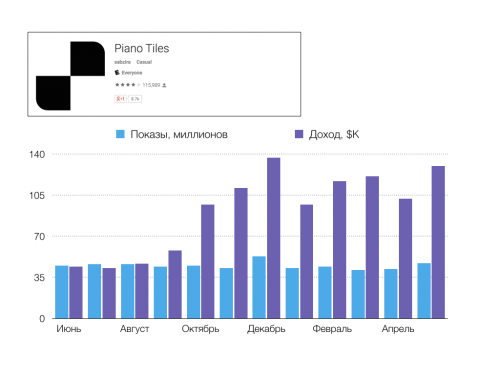At the end of June, it became known that the Appodeal monetization service raised $3.1 million. We talked with the founder of the platform Pavel Golubev about Appodeal, how advertising networks usually work, and also asked how to place banners correctly in mobile games.

Hi! Tell me about yourself! What did you do before, why did you take up mobile advertising?
Pavel Golubev
Hi! I have technical experience. I’ve been a programmer all my life, I’ve been developing games. Then it so happened that I got into a mobile startup. Then I got acquainted with the whole mobile history. And while we were doing a startup, I was very closely faced with mobile advertising. And at that moment he took up the development of mobile technology, which was called “effective user engagement in mobile applications”. Made this technology. From this, everything went-went. We started making mobile apps, games, and promoting them. Since 2011, more than three thousand applications have been published, which were not developed by themselves, of course, but were created by third-party studios. And a year ago, when we had such a large database of applications on our hands, we were talking about how to optimally monetize them. We started automating issues related to monetization. So we got this product – Appodeal. We made it, first of all, for ourselves to monetize our applications, and then we wrapped it in a beautiful wrapper and began to offer it to everyone on the market.
Did I understand correctly that everything came from technology, and not from a love of games or a love of advertising networks and platforms?
Appodeal, rather, is made out of dislike for advertising grids. There is such a story with advertising networks: they are all focused on advertisers. The reason is simple: the one who pays the money is served, and the advertiser pays the money. They have all sorts of targeting, reports, whatever you want there for them, and for publishers, for those who show ads…
Advertising networks, as a rule, even if you have a large volume of traffic, they are not interested in you much. Of course, they are partly interested, but they do not provide the tools you need, which you demand from them, because you do not pay them money.
We are tired of the situation that we are being bullied everywhere, they don’t want to offer the opportunities that we need anywhere. That’s why we started making Appodeal for ourselves.
Then please explain how the service works? It’s just that when you visit the site for the first time, the first thought is: another advertising grid or something like an RTB exchange. But from what you’re saying, it’s not. So what does Appodeal do?
We have a unique service, there are no such on the market. Of course, it looks like an advertising network. Appodeal is a comprehensive solution specifically for the monetization of applications aimed at developers. It includes quite a lot.
Our most important task is to neutralize the existing preponderance towards advertisers. Balance the system in such a way that publishers also get their piece. This is manifested in the fact that we force advertising networks to compete with each other for a place in a particular application.
For example, after you sign a contract with AdMob (or indeed any grid), you install its SDK – it no longer needs to compete with anyone in order to show ads in your application. Therefore, he shows as much as he wants and as he wants, while keeping most of the margin for himself.
We put AdMob and other networks in a position where they have to compete with each other. And then each of them starts thinking, a la “aha, if I pay too little, then I won’t have the opportunity to show ads in this application, someone else will show it here.” Therefore, within the framework of our system, they place much higher rates, while maintaining their marginality, which at the same time becomes more, let’s say, fair.
This is one of the moments.
We are also trying to make a comprehensive solution for the monetization of applications. We solve our problems, the ones we had.
For example, I personally have always been annoyed that it takes an advertising network from 30 to 60 days to get their money. This is generally nonsense. You have turned off your traffic and in some cases you have to wait almost three months for your money, so we have proposed a solution to this problem.
We pay earnings in advance. The money that your application earned in one of the advertising networks that we work with, you can request in our system. And they will be sent to you within a few days. Although if you worked with AdMob, she wouldn’t pay you anything until 30 days had passed.
And why do the grids need you, you’re creating a problem for them?
We use it to attract users from the market. They have more access to applications in which it is potentially possible to display ads. No one obliges them to show ads for expensive or to work to their detriment, we just provide access to traffic. And if an advertiser wants to get a place in a particular application, he can do it. In this sense, for any advertising network, we are an ordinary publisher.
A year ago, publishers appeared who started aggressively making money on applications from advertising, and not from IAP (the most striking example is Ketchapp). Which free-to-play model do you think is more viable, built on advertising or on IAP? Why am I asking: the fact is that now some companies are noting an outflow of the number of payers from market leaders. Only the whales remain.
As a publisher, I will say that we have never managed to make a project that would make good money on IAP. This does not mean that it cannot be done in principle, it just didn’t work out for us. We ultimately chose the advertising model ourselves for several reasons. In order to make a game with IAP, you need to invest much more in production. Accordingly, the risks are much higher. You can make a game for a year, and then you just don’t shoot it. And for those applications that earn money from advertising – and the requirements are less, and the expectations are not so high.
In general, it is difficult for me to talk about the general situation on the market, since we specialize in those applications that are monetized through advertising. I haven’t been doing the IAP segment for a long time.
How would you advise to work with advertising for young developers who are just putting out their first game and don’t know how to insert it, but how not to?
I have a lot of specific advice.
To begin with, I’ll tell you what not to do. It is not necessary to show ads immediately at startup or right before exiting it. Here is a very simple situation. The performance of any advertising and, in general, your earnings from advertising directly depends on how interesting the content is shown in the banner. That is, if you show ads that are not interesting to the user, then you will not earn anything. It is logical to assume that when only the user launches the application, then, of course, you will have a lot of advertising impressions, but at this moment the user is set up to see what kind of application it is. He doesn’t open the app to see the ad and go somewhere on it. Therefore, such advertising leads to a deterioration of the user experience, poor ratings and does not generate revenue.
As for advertising when exiting the application, the conversion is better here, but this is not treated well on Android. Despite the fact that there are even quite large applications on Google Play that allow themselves to do this, there is a risk of blocking such a program. I have met with this very often.
It is most correct to show ads at the moment when the user is just about to leave your application, or has completed some logical action. The simplest example: completing a level in a game. The user passed the level, completed the logical action, received an advertisement. At this point, the conversion rate is the highest.
In order not to annoy users, it is not recommended to show ads more often…
We have such an internal rule in our company. We show ads no more than once a minute at the end of the level. And we show the video no more than once every three minutes.
This is also quite common.
This often sounds, but on smartphones, the gaming session is quite short – a few minutes. It’s on the verge, but we also don’t want to show ads once a day so that no one notices it. And they won’t swear, but we also have tasks to earn. Therefore, it is necessary to show a lot of advertising, not to pay attention to users who swear, because there will always be such. But we have defined such a red threshold for ourselves: a full-screen banner – once a minute, a video – once every three minutes.
Ordinary banners, like 350 by 50 pixels – such stripes – we do not use at all. They work now only in huge applications that have been on the market for a long time and have a large volume of such banners. You can earn money on a large volume, but since the question was on behalf of small developers, and, as I suspect, they don’t have much traffic, banners won’t give them profitability, but will only spoil the impression of the game.
It should also be remembered that it makes no sense to launch a new application with advertising, since the task of the new application is to grow in the top, collect organic matter. Accordingly, the main task is to get good grades so that people recommend the application to each other. Without advertising, it gains a critical mass of users, only after that we turn on advertising.
How much is critical mass?
It depends on the application, but we don’t have very big games, for us a good indicator is when the application earns at least a few thousand organic users per day. Earns money? You can think about turning on advertising.
And the last question is about the cases. What examples can you attract?
We usually mention “hares.No,” but we mention them everywhere, so I don’t think this will be a good example right now. The best case is our own applications. One of our applications that has achieved good results with the help of the service is Piano Tiles.
Appodeal was put into play in September. After that, over time, the revenue with the same number of impressions tripled.


